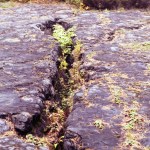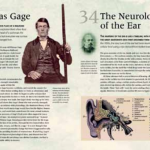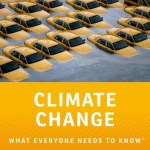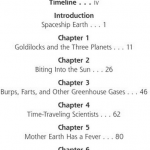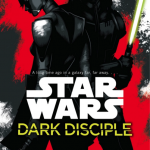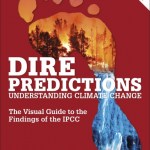book review
This latest book in my reviewing adventures continues the recentish trend of books concerned with science during World War II. Michael Hiltzik's Big Science: Ernest Lawrence and the Invention that Launched the Military-Industrial Complex follows books such as Serving the Reich: The Struggle for the Soul of Physics under Hitler, Planck: Driven by Vision, Broken by War and Les Rêveurs lunaires: Quatre génies qui ont changé l’Histoire. A little further back, there's Engineers of Victory: The Problem Solvers Who Turned The Tide in the Second World War and Hitler’s Scientists: Science, War, and…
This is a review of The Story of Life in 25 Fossils: Tales of Intrepid Fossil Hunters and the Wonders of Evolution.
Don Prothero
Fossils are cool. Why? Two very big and complex reasons. First, fossils allow us to reconstruct species that don’t exist any more. This is usually done by studying species that do exist, and using the information we glean from living things to interpret the details of the fossil species, giving it life. Second, fossils tell us about evolutionary change, both by showing us what evolutionary events happened that we would not be able to see in living species, and…
In 1817, Karl August Weinhold had a go at a real-life Frankenstein's monster -- only in his version he uses a cat. The German scooped out the brain and spinal cord of a recently dead cat. He then pured a molten mixture of zinc and silver into the skull and spinal cavity. He was attempting to make the two metals work like an electric pile, or battery, inside the unfortunate cate, replacing the electrical of the nerves. Weinhold reported that the cat was revived momentarily by the currents and stood up and stretched in a rather robotic fashion!
It's Alive!!!!
Weinhold's reanimated cat was…
Climate Change: What Everyone Needs to Know® by Joe Romm is just out, and is the most up to date examination of climate change science, the effects of climate change on humans, policy related problems, and energy-related solutions. Everyone should read this book, and if you teach earth system sciences you should consider using this book as a guide in your teaching, or in some cases, assigning it in class. The book is written to be read by general audiences, so it would work well in a high school or college setting.
As Romm points out, climate change will have more of an impact on humans,…
Years ago I proposed a theory (not anywhere in print, just in seminars and talks) that went roughly like this. Humans hunt. Dogs hunt. Prey animals get hunted. Each species (or set of species) has a number of characteristics such as the ability to stalk, track, kill, run away, form herds, etc. Now imagine a landscape with humans, wolves, and game animals all carrying out these behaviors, facilitated with various physical traits. Then, go back to the drawing board and redesign the system.
The hunting abilities of humans and dogs, the tendency of game animals to herd up or take other…
Serving the Reich: The Struggle for the Soul of Physics under Hitler by Philip Ball and Planck: Driven by Vision, Broken by War by Brandon R. Brown are two of the best history of science books I've read in a very long time. And even though they're both about World War II, some seventy years in the past, they've both also very topical because they are both very much about the relationship between politics and science. In a sense, what comes first, the political chicken or the scientific egg. Are scientists responsible for how their work is put to use by their political "masters?" Do scientists…
Climate Change: Discover How It Impacts Spaceship Earth (Build It Yourself) covers many concepts in earth science, from paleontology to climate systems to how to make a battery out of apple (how can a kid's science activity not include the apple battery!). This book represents an interesting concept, because it involves kids in mostly easy to do at home projects, covers numerous scientific concepts, and takes the importance of global climate change as a given. There is a good amount of history of research, though the book does not cover a lot of the most current scientists and their key work…
It's tempting to go a couple of different ways here.
A book that has "Insanely Great" in the title? What could possibly go wrong?
On the other hand....
A kids book about what a jerk Steve Jobs was. What could possibly go wrong?
Steve Jobs: Insanely Great by Jessie Hartland. An illustrated biography of Steve Jobs aimed at a younger audience which gives an honest, unflinching look at his life, warts and all. Maybe not up to the "insanely great" standard, but engaging and enjoyable with a lot of openings for parents and children to talk about how complicated real people are.
What more could you…
Jonathan Marks' new book is called "Tales of the Ex-Apes: How We Think about Human Evolution"
I've got to tell you that when I first saw the title of this book, the letters played in my head a bit. Tails of the Ex-Apes. That would be funny because apes don't have tails. Or Tales of the Exapes. Pronounced as you wish. Perhaps in an Aztec accent.
Anyway...
Jon Marks is a colleague and a friend from way back. He is a biological anthropologist who has engaged in critical study of central biological themes, such as genetics, and he's said a few things about race. He wears black, often does…
Cédric Villani's Birth of a Theorem: A Mathematical Adventure has risen to the top of my Best Science Book of 2015 list. It'll be tough for another book to kick it off that summit before the end of the year, that's for sure.
The name Cédric Villani probably sounds a bit familiar to most who follow the science world reasonably closely. That's because he's the spider-pendant wearing, cravat and three-piece suit porting, Fields Medal winning French mathematician who's currently the director of the Institut Henri Poincaré in Paris. He's known in math circles for his work on nonlinear Landau…
Gabriella Coleman's Hacker, Hoaxer, Whistleblower, Spy: The Many Faces of Anonymous is largely a laudatory history of the Anonymous hacker activist movement with some anthropological and political analysis. Whitney Phillips' This Is Why We Can't Have Nice Things: Mapping the Relationship between Online Trolling and Mainstream Culture on the other hand, is much more geared towards an analytical and philosophical analysis of past and present (and even future) of how online trolling relates to contemporary culture.
Neither book is perfect, and both tend to falter where it comes to how closely…
Sydney Padua's The Thrilling Adventures of Lovelace and Babbage is one of the most flat-out entertaining books I have read in a very long time.
You should buy this book. Your library should buy this book. Buy a copy of this book for all your friends.
What's all the fuss?
TTAoLaB is a graphic novelization of the lives of Ada Lovelace and Charles Babbage, those wacky pioneers of computers and programming. But TTAoLaB isn't really just a novelization of their lives -- really only the first chapter or so pretends at any kind of historical accuracy. What it is is an imagineering of what their…
Science! What's it good for? Working towards better knowledge about the natural world!
Under review today are two books that approach what science is and what it's good for from very different angles. Steven Weinberg is a Nobel laureate in physics and in his book To Explain the World: The Discovery of Modern Science he uses the example of the development of physics and astronomy in modern times to show how the scientific method has been developed and evolved over time. Harry Collins is a sociologist who was instrumental in developing the fields of science studies and the sociology of…
A Guest Review by John Abraham
Wow! I just put down the best science fiction book I’ve read in a long time, and certainly the best Star Wars book I’ve ever read. Just like Lord of the Rings and Game of Thrones have made fantasy stories hip, the rebooted Star Wars franchise is making science fiction cool again for audiences of all ages.
The new book, which goes on sale today (July 7th), is called Star Wars: Dark Disciple (written by Christie Golden). It is part of a new series of stories that are part of the Star Wars canon and it involves nearly all of the characters we’ve come to cherish…
A bit of a change of pace for me and my reviewing habits -- a book written in French!
Of course, books about science or scientists are pretty typical review fodder for me. And even more typically, graphic novels about science or scientists are incredibly common for me to review. But books in French? This is a first.
During my recent month-long stay in Paris (sabbatical life FTW!) one of the things I really enjoyed about the City of Light was the profusion of bookstores. Bookstores, record stores, bandes dessinées stores, every neighbourhood had a least a handful of good ones. Which is in…
I am not trying to deny the transformative nature of the Internet, but rather that we've lived with it long enough to ask tough questions.
...
I've tried to avoid the Manichean view of technology, which assumes either that the Internet will save us or that it is leading us astray, that it is making us stupid or making us smart, that things are black or white. The truth is subtler: technology alone cannot deliver the cultural transformation we have been waiting for; instead, we need to first understand and then address the underlying social and economic forces that shape it. Only then can we…
A bit unusually for me, I'm reviewing a novel as part of my Reading Diary series. Usually the closest I'll get to a novel is a fictionalized science graphic novel of some sort, kind of like the Survive! series or Lauren Ispsum.
But no, this ain't one of those. It's a good old fashioned novel.
OK, it's a climate change fiction novel that's kind of like an Adam Sandler or Will Ferrell romantic comedy but starring Seth Rogan and Jennifer Lawrence. Set on a community college campus, it has a bit of a feel of The Absent-Minded Professor or even The Nutty Professor for the cli-fi set.
So what have…
What is digital governance in the first place?
Digital governance is a discipline that focuses on establishing clear accountability for digital strategy, policy, and standards. A digital governance framework, when effectively designed and implemented, helps to streamline digital development and dampen debates around digital channel “ownership.”
-- From the Managing Chaos: Digital Governance by Design website.
Universities
Intellectual autonomy and stubbornness of staff
-- From the index, Managing Chaos: Digital Governance by Design, p. 229
Time to take a little medicine! All those…
Dire Predictions: Understanding Global Warming by Michael Mann and Lee Kump is everyperson’s guide to the latest Intergovernmental Panel on Climate Change (IPCC) report. The IPCC issues a periodic set of reports on the state of global climate change, and has been doing so for almost two decades. It is a massive undertaking and few have the time or training to read though and absorb it, yet it is very important that every citizen understands the reports’ implications. Why? Because human caused climate change has emerged as the number one existential issue of the day, and individuals,…
This roundup includes reviews of a bunch of recent and not-so-recent reading about Canadian politics, in particular the Harper government and how it controls information. Some of the books are pretty directly related to science policy and some, not so much. These are all worth reading, some kind of overlap while others present fairly unique approaches. All were useful to me in my long term interest and work around Canadian science policy and in understanding the current Canadian Conservative government's anti-science attitudes. All are solid additions to the growing body of work on the…
